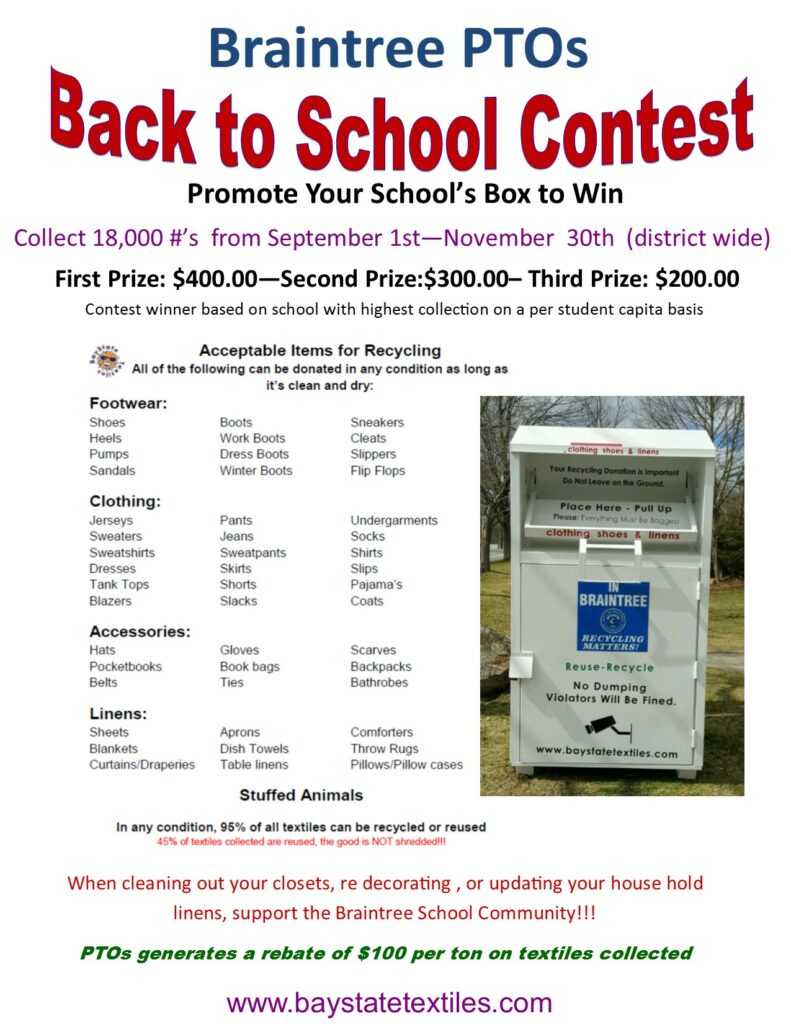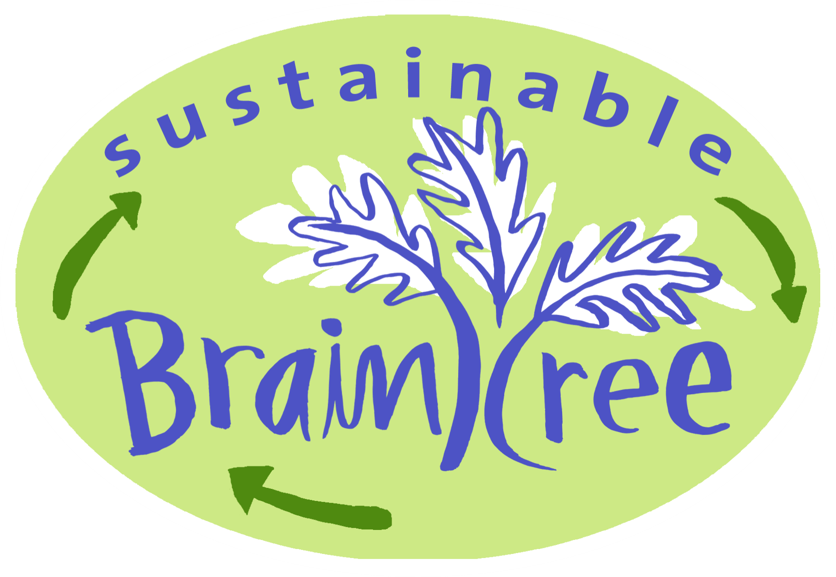Sustainable Braintree advocates for responsible consumer choices and the reduction of waste as precursors to ongoing recycling efforts. We are also committed to raising awareness of the negative impact of plastics on environmental and human health.
The now famous adage 'Reduce, Reuse, Recycle' is listed in that order very intentionally. There are a lot of people on this planet and massive consumption potential. If we don't consume responsibly the results can be damaging to our environment and also our selves.
In order to protect our planet and ourselves, we need to adopt consumption habits that reduce (do I really need this?), reuse (is this disposable or is it made durably so that I can reuse it?) and recycle (what happens to this when I am ready to get rid of it?) are in order.

Reduce... especially plastic
Plastic is a problem all around. So if we want to start reducing consumption of things this is a really impactful place to start. Conventional plastics are petro-chemicals (derived from fossil fuel oil) that are cheap to make and very convenient to use. However, there are huge environmental and human health costs that come with it.
- Most plastics are made from oil, they add to the demand for fossil fuels, the burning of which cause global warming
- The production of plastic often creates serious air and water quality risks in the places (often developing, under-regulated nations) where they are produced
- The ingredients of most plastics are complex, changing, and highly secretive, so we never really know whats in them until people start getting sick - remember BPA?
- Plastics take hundreds and sometime thousands of year to biodegrade and when they do they break down and find their way into our food streams, via plants and animals
Reuse... as much as possible
We all love the look of new things, in fact we are constantly being marketed to for 'this seasons' new look, whether it is clothes or furniture. It would be easy to overlook if good weren't being produced so cheaply.
And who doesn't love getting a bargain? But how many of us have a had a bargain quickly turn into another shrunken shirt or broken electronic device that is either not fixable or not cost-effective to fix?
'Reusing' in our hyper-consumption economy is probably the toughest part of the the 'Three R's'. However, not all products are planned for obsolescence and disposal. Long term thinking is what is required here. Can these shoes be re-cobbled? Will this table be falling apart in 5 years? There are a myriad of good questions that we should be asking ourselves before we purchase and then again before we feel the need to replace anew.
But when it is time to dispose of something what happens to it? If its a large item there someone else that can use it? If it is a small item, it is recyclable or compost-able? Or does it really need to go to that waste-to-energy incinerator in Wareham? (That's where Braintree's trash goes.)
Recycle... why this is the last option
The ideas and assumptions that many of us have grown accustomed to since the advent of 'single stream' recycling came up against some harsh realities in 2018.
The ‘recycle everything’ attitude that many of us once had needs to be re-examined. Another adage, 'if something sounds to good to be true it usually is' applies here as well. As it turns out, many of those questionable items that we were ‘recycling’ in the past were not actually being recycled. Furthermore, many careless recyclers were contaminating the stream with uncleaned recyclables. The results? Many years of 'recycled' materials being scattered around landfills/forests/oceans globally. One only needs to look at the massive plastic pollution in our oceans to see the effects.
In 2018 when other countries decided one-by-one to stop taking our taking our trash along with our recyclables, haulers throughout the US were forced to either start charging more to sort the trash out OR put the onus on the businesses and communities they serve.
To that end, the Mass DEP has worked with local haulers to create new guidelines to help businesses and communities clean up their acts. This includes Braintree and the Towns Recycling website is up to date with all of the latest information:
https://braintreema.gov/recycling/
Beyond the Curbside:
There are many ways to recycle items that do not fit into our curbside recycling programs. We've provided a list below, but another really good resource is Earth 911.
Textiles and clothing
Recycling unwanted textiles and clothing can be done at each of our school buildings via the Bay State Textiles drop box.

Batteries
Rechargeable batteries can be recycled at any Best Buy store nationwide or Whole Foods.
Rechargeable Apple product batteries can be recycled at any Apple retail location.
Cell Phones
Wireless (e.g. T-mobile, Verizon, ) retail stores accept phones in any condition from any service provider. These phones are either refurbished or recycled.
Cell Phone for Soldiers also accepts cell phones for recycling. They buy prepaid calling cards for soldiers.
CFL and Other Flourescent Bulbs
Home Depot, Lowe’s and Richmond’s Hardware accept your old CFL bulbs for free. These bulbs contain small amounts of mercury and should not be thrown away or recycled with glass bottles.
Crayons
Recycle your broken crayons with the paper still on them or boxes of crayons you get at restaurants to be recycled into new “crazy crayons.” Crayons are a petroleum product and it takes a year for them to biodegrade.
Electronics
Best Buy has an in-store recycling program.
The EPA website also has guideline and ideas on electronics recycling that are too many to list here.
Eyeglasses
Donate old prescription eyeglasses or non-prescription sunglasses at a Lens Crafters near you. They provide free sight care and eyewear to under-privileged individuals in North America and developing countries.
Give them to the Lions Club “Lions in Sight” Program which brings basic eye care and glasses to the needy.
Fitness Videos (!)
Swap old fitness videos for something else.
Unwanted Mail/Junk Mail
The key is to get your name off the mailing lists. Go to www.directmail.com and read the Frequently Asked Questions first.
Remember to put all junk mail into your Single Stream bin.
Packing Peanuts/Bubble Wrap
Take foam packing peanuts and bubble wrap to your nearest UPS Store or Mail Boxes Etc. They will be glad to have it.
Printer Cartridges
Empty cartridges are accepted at Staples or Office Max. They can be refilled or exchanged for cash or copy paper. Also check your local paper for a school near you that may collect them as a fundraiser.
Sports Equipment
Sell your used sports equipment at Play It Again Sports stores in Dedham, Hyannis, Leominster, North Reading, or Stoneham. Visit their website for more information.
Styrofoam (large pieces)
Large pieces of Styrofoam (eps) used to package TVs, electronics etc, for shipment can be recycled at any of the businesses below. Learn more here.
Tools
Donate tools to your local Habitat For Humanity. They will use them to building affordable housing.
Toothbruses
ReUse your old toothbrushes for cleaning the tiles in the bathroom, car parts, the mud off your shoes; or for making a spatter painting with your children.
Preserve products including recyclable toothbrushes and razors. Get them at Target, Trader Joe’s or Whole Foods. When they are no longer useful, they will recycle them into plastic lumber. Click here for more information.
Wine Corks
Send your wine corks (not the plastic ones) to Yemm & Hart, who will recycle them into cork tiles. Whole Foods also accepts natural corks.
General Recycling/Donation Sites
Here are resources for selling, donating or trading items.
Big Brothers / Big Sisters
Craigslist
Freecycle
Goodwill
Ireuse
Salvation Army
Throwplace
Viet Nam Veterans of America
